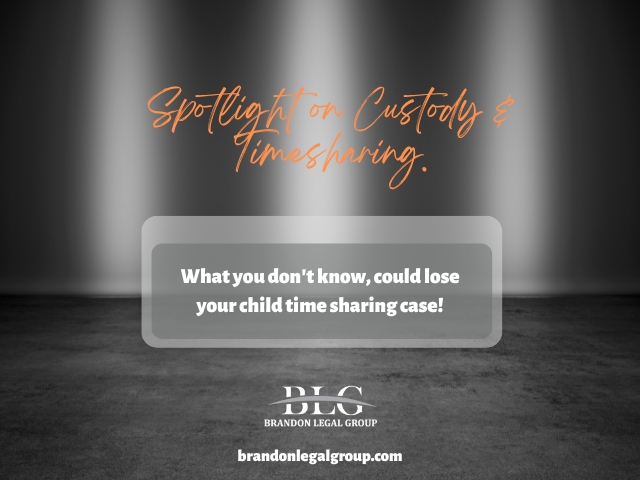Unfortunately, it’s can be difficult to avoid custody battles, often due to claims that a parent is unfit, drug use, extreme hostility between the parents, or  parental alienation. Knowing how to set yourself up to get what you want with the ten tips below, you can avoid the most common problems during custody battles.
parental alienation. Knowing how to set yourself up to get what you want with the ten tips below, you can avoid the most common problems during custody battles.
1. Think about your strengths and weaknesses as a parent.
Being personally honest with your own life and parenting style can be the most important thing a parent can do. The best outcomes are driven by “both parents” understanding their strengths and weaknesses as parents and making any necessary changes. “Both parents” however, is often impossible; otherwise, you wouldn’t be reading this. At times like that, at least one parent acting as an adult is better than none! “Honesty” is important because that’s how you should look at yourself. For instance, do you drink alcohol more often than is good for you? Do you engage in inappropriate drug use? Do you often use marijuana despite not having a medical marijuana card? Do you work all the time and rarely go home? Now is the time to think about how your lifestyle choices may affect the court’s view of how you raise your kids. Sometimes, taking a harsh look at your personal habits, even when they are seemingly innocuous, can be incredibly difficult. Look through the lens of someone that doesn’t know you on the outside looking in, that is also hearing your soon-to-be former spouse’s story.
2. Abandon Social Media Posting
Don’t post anything on your social media accounts; make your social media private. It’s hard to say enough about how important social media evidence can be in a fight between parents over who gets to keep a child. Evidence of drug and alcohol use, having the kids at dinner with a parent’s new partner, taking pictures of things the other parent shouldn’t have done with the kids, unreported vacations, expensive purchases, etc., are just a few examples. Remember, even the most innocent outing can be twisted into something evil by a desperate or vindictive former spouse. Do yourself a favor and stop sharing other parent’s’ posts on social media.
3. Don’t say bad things about the other parent in front of or to your kids.
Denigrating the kids’ other parent has 2 negative effects. First, the court frowns on it, and it will add to the list of things to use against you. Second, from your kid’s perspective that other parent is half of who they are genetically. Trash-talking the former spouse can lead to deep-seated psychological issues for your child.
So if you need to rant, please do it away from your kids (and social media!). Vent with a therapist, your parents, your friends, can be called to testify, and they would have to honestly reply, you trash talk your former spouse, a therapist is bound by patient-client confidentiality.
4. Make a daily record of what you do with your kids.
During a fight over child custody, parents often disagree about what they did or didn’t do with their kids. Keeping a detailed record of how you help your kids and what they do can be very helpful in the future, whether you’re talking to your lawyer or the guardian ad litem. It is also especially important to record what the other parent didn’t do, and how they have interfered.
5. Tell the other mom or dad
Be transparent and communicative about events that involve the kids. Even if you don’t think the other parent will attend a Dr. appt or a recital, you must appear to be the one encouraging a relationship with the other parent, which is a part of the court-required criteria a judge is required to take into consideration. All upcoming events must be written down and sent to the other parent. This includes school issues (good and bad), from grades to teachers’ notes, doctor’s appointments, practices, games, recitals, etc. If you don’t, you could be accused of intentionally leaving out the other parent to make it seem like he or she never comes to the kids’ activities.
6. Write down everything you say or do with the other parent.
In every child custody case, the question of whether or not the parents can talk to each other about the kids is a required issue that the courts must consider. The judge always takes this into account. Conversation records could show how well you and your partner talk to each other or how badly the other parent talks to you. Keep track of any emails or texts you send or receive with the other parent about the kids.
Hint… remember you pay your attorney to read everything you write. That can get EXPENSIVE, with little value in court. An excellent piece of advice is, if you can’t say it neutrally in 2 sentences, don’t send it until you have had a moment to communicate more neutrally, more succinctly, and without rancor.
7. Don’t try to talk to the other parent through your children.
No matter how much you dislike the other parent, it is not your children’s job to communicate with them on your behalf. Once again, this is an issue that the courts are required to visit when evaluating custody disputes. You should call, text, or email the other parent instead of acting as their go-between. Refer back again to #6. Keep it brief, communications about your children are NOT the place to drag grievances and emotional angst into the conversation. “just the facts jack” should be a mantra when it comes to communicating with “the other side”.
8. Passwords You Can Change
Change the passwords on all your electronic devices, like your home computer, phone, and anything else the other parent might be able to use. Also, change the passwords for all your email and social media accounts. Changing passwords as early in the process as possible may avoid many problems in the future. However, do not revoke access to the other parent on things that they must reasonably have access to. They need access to a checking account with their names on it, they should have access to school portals. However, your personal email – you have no idea if they know your password or not, change it. Your personal investment accounts, change the password.
There are many positive things you can accomplish while fighting for custody. A big part of a custody battle is how people see things. The court will agree with what it thinks is true. Try to show that you are willing to work with the other parent. Never be late to meetings, custody exchanges, or court hearings related to the custody case. This will only make you look bad and will be used against you in the future. Even if you don’t get along well with the other parent, who may be your ex, you must show that you can work with them to figure out custody.
Having an attorney focusing on family law, is one of your biggest assets to help you learn how to manage the difficulties in learning to communicate during a custody battle.
